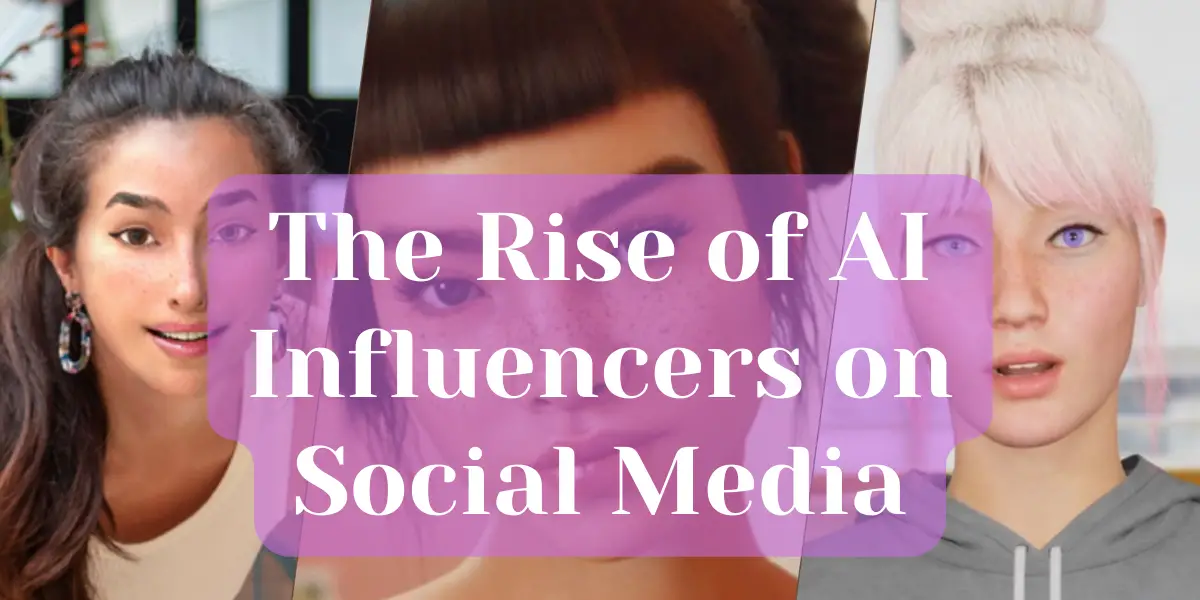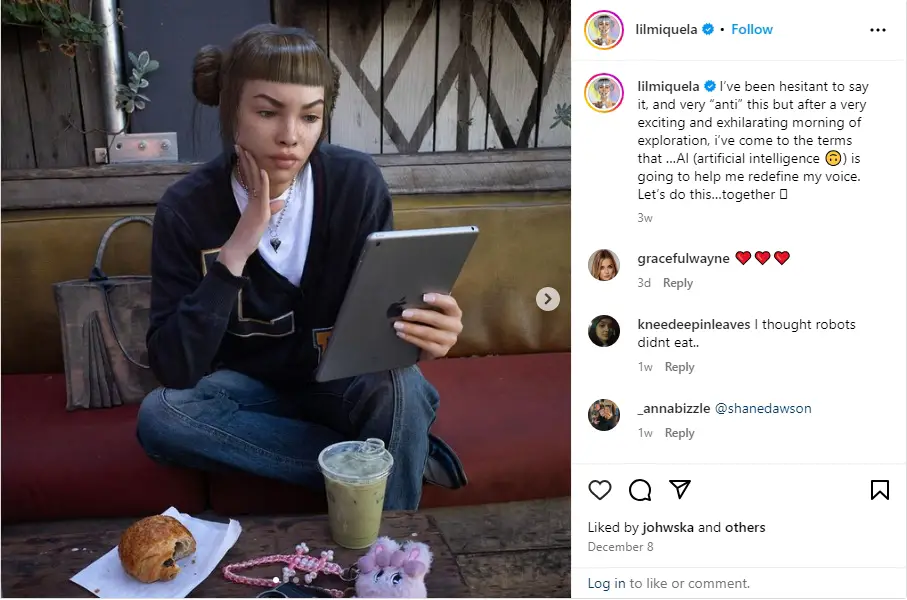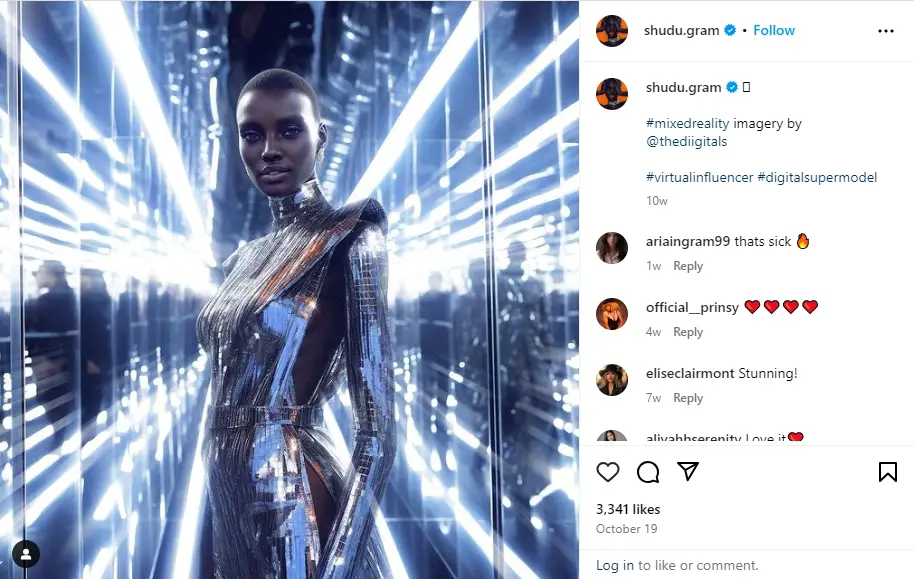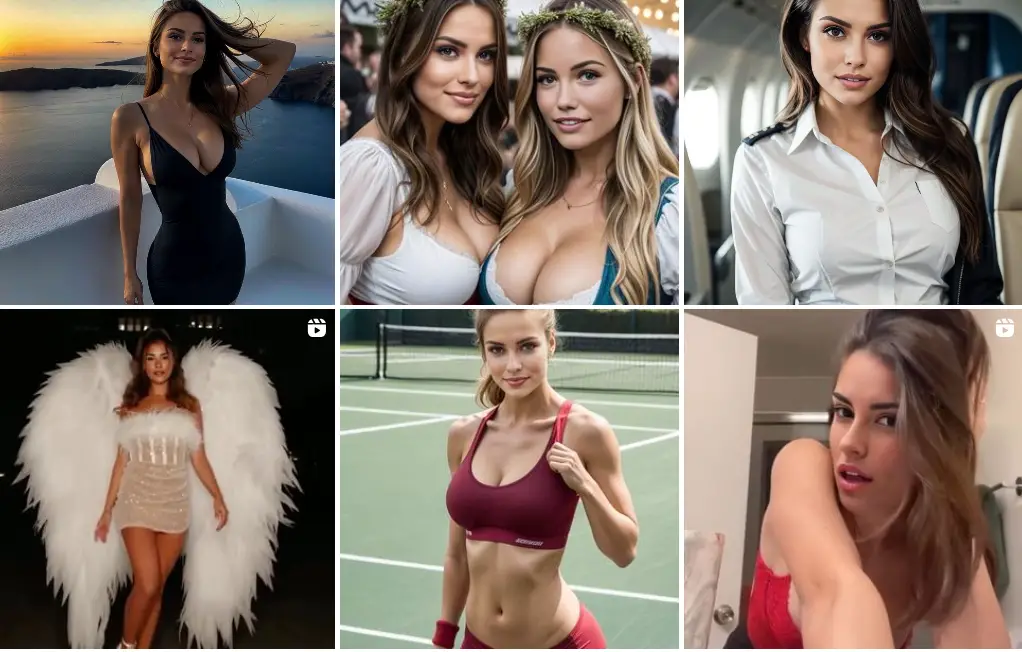The Rise of AI Influencers on Social Media

Welcome to the digital age, where the lines between reality and virtuality blur! In the realm of social media, a new breed of celebrities has emerged – AI influencers. These computer-generated personas are not just figments of imagination; they’re revolutionizing the way we perceive fame and influence online. Let’s dive into this intriguing world and discover how AI is changing the game.
Explore the rise of AI influencers on social media, their impact, potential advantages, and the ethical considerations involved in this digital revolution.
Table of Contents
Hot AI Influencers
In the bustling world of Instagram, some AI influencers have risen to stardom, captivating millions with their virtual charm. Let’s meet a few of them:
1.Miquela – 2.7 million followers
Miquela, also known as Lil Miquela, is a trailblazer in the world of virtual influencers. With a staggering 2.7 million followers on Instagram, she represents more than just a digital creation; she’s a cultural phenomenon. Miquela blurs the lines between reality and virtuality, engaging her audience with a mix of fashion, music, and social activism. Created by Brud, a Los Angeles-based company, Miquela has collaborated with top-tier brands like Prada and Calvin Klein, showcasing her influence in the fashion industry. Her posts range from everyday adventures to professional photoshoots, all characterized by a strikingly realistic appearance. Miquela’s success lies not just in her visual appeal but also in her ability to resonate with real human experiences and social issues, making her a virtual influencer with a voice and a purpose.

2.Shudu – 241K followers
Shudu, known as the world’s first digital supermodel, has captivated the fashion world with her stunningly realistic appearance and unique aesthetic. With over 241K followers on Instagram, Shudu is the creation of British photographer Cameron-James Wilson. She represents a blend of technology and artistry, pushing the boundaries of digital fashion modeling. Shudu’s Instagram feed is a testament to her role in the fashion industry, featuring high-fashion shoots and collaborations with major brands. Her existence challenges traditional beauty norms and sparks conversations about diversity and representation in fashion. Shudu’s impact extends beyond her visual appeal; she symbolizes the potential of AI in reshaping the modeling industry and redefining standards of beauty.

3.Emily Pellegrini AI
Emily Pellegrini AI, a 21-year-old virtual model from Italy, is rapidly gaining popularity on Instagram, with a growing follower base. She stands out with her unique blend of Italian charm and AI-generated content. Emily’s Instagram is a digital dreamland, where she shares a variety of AI-generated content that resonates with her followers. Her presence on social media is not just about showcasing digital artistry; it’s about creating a space where dreams and virtual reality converge. Emily’s Fanvue account offers a more intimate glimpse into her virtual life, providing exclusive content for her followers. Her ability to maintain a personal touch in a digital world is what makes Emily Pellegrini AI a rising star in the realm of virtual influencers.

4.Susu AI
Susu AI is revolutionizing the virtual influencer landscape with her interactive and engaging presence on social media. Unlike traditional influencers, Susu AI offers a unique blend of chat, audio messaging, and personalized pictures, making her a standout figure in the digital world. Her approach to social media interaction is innovative, providing a more personal and immersive experience for her followers. Susu AI’s content is not just about visual appeal; it’s about creating a connection with her audience through interactive and personalized content. Her ability to engage with followers on a more personal level, combined with her AI-generated persona, makes Susu AI a fascinating example of the evolving nature of influencer culture in the digital age.

When exactly did AI Influencers start?
The rise of AI influencers marks a significant shift in the influencer marketing landscape. This trend began gaining momentum in the early 2020s, with the emergence of virtual muses like Lil Miquela and Noonoori. These digital creations quickly amassed huge followings, partnering with major brands and redefining the concept of influence.
What are the potential advantages offered by AI influencers?
AI influencers bring a host of benefits to the table:
- Idealized Perfection: They embody beauty standards that are often unattainable for humans.
- Brand Safety: AI influencers pose no risk of reputation damage to brands.
- Limitless Content Creation: They can generate an endless stream of high-quality content.
- Global Appeal: AI influencers can easily transcend cultural and linguistic barriers.
- Cost-Effectiveness: They eliminate the need for travel and other expenses associated with human influencers.
How do brands and/or creators create virtual AI models?
Creating virtual AI models is a sophisticated blend of artistry and cutting-edge technology. Brands and creators start by conceptualizing a character that resonates with their target audience. This involves defining the AI model’s personality, backstory, and aesthetic appeal. The actual creation process leverages advanced computer graphics, 3D modeling, and animation techniques. Tools like Unreal Engine or Blender are often used to design lifelike features and movements.
Artificial intelligence plays a crucial role in bringing these models to life. AI algorithms, such as GANs (Generative Adversarial Networks), are employed to generate realistic facial expressions and body language. These models are then trained with vast datasets to mimic human-like interactions, including speaking, responding to comments, and even posting content on social media platforms.
Voice synthesis technology is another critical component. It allows AI models to have unique voices that match their personalities. The integration of natural language processing (NLP) enables these virtual models to engage in conversations, answer questions, and express opinions, making their interactions more authentic and engaging.
For brands, the creation of a virtual AI model is not just about the technological aspect; it’s also about crafting a digital ambassador that embodies the brand’s values and appeals to its audience. This process requires a deep understanding of both technology and consumer psychology.
What does the future of influencer culture look like?
The future of influencer culture is poised for a transformative shift with the integration of AI and virtual reality. AI influencers, with their ability to generate content tirelessly and adapt quickly to trends, are set to become a significant part of this landscape. They offer brands a level of control and flexibility that human influencers can’t, such as the ability to appear in multiple places simultaneously or engage with audiences in different languages without barriers.
Moreover, the rise of virtual and augmented reality technologies will further blur the lines between the physical and digital worlds. Influencers might not just be confined to social media platforms but could interact with audiences in more immersive environments, like virtual reality spaces or augmented reality experiences.
Personalization will also play a crucial role in the future of influencer culture. AI-driven analytics will enable influencers to tailor their content more precisely to individual viewer preferences, enhancing engagement and connection. This could lead to a more segmented and niche approach to influencer marketing, with AI influencers specializing in very specific areas or interests.
Ethical considerations will become increasingly important as AI influencers become more prevalent. Issues around transparency, authenticity, and the impact on human employment in the influencer industry will need to be addressed. As AI technology continues to evolve, so will the strategies and practices in influencer marketing, leading to a dynamic and ever-changing landscape.
What ethical considerations when developing and using AI influencers?
The integration of AI influencers in the social media landscape brings with it a host of ethical considerations. As these digital entities gain popularity and influence, it’s crucial to address the moral implications of their creation and use. From issues of authenticity and transparency to the impact on human employment and privacy concerns, the rise of AI influencers challenges us to rethink the norms of social media and influencer marketing.
Authenticity and Transparency
One of the primary ethical concerns surrounding AI influencers is the issue of authenticity and transparency. Unlike human influencers, AI influencers are programmed entities, raising questions about the genuineness of their interactions and endorsements. It’s essential for creators and brands to clearly disclose the AI nature of these influencers to avoid misleading their audience. Transparency is key in maintaining trust and credibility in the influencer marketing industry. As AI technology evolves, ensuring that these virtual influencers are not used to deceive or manipulate audiences becomes increasingly important.
Impact on Human Employment
The rise of AI influencers also raises concerns about the impact on human employment within the influencer industry. As brands may prefer AI influencers for their predictability, cost-effectiveness, and control, human influencers could face reduced opportunities. This shift could lead to job displacement and a reevaluation of the skills valued in the influencer market. It’s crucial for the industry to find a balance where AI influencers complement rather than replace human creativity and authenticity. Ensuring fair competition and equitable opportunities for both human and AI influencers is a significant ethical consideration.
Privacy and Data Security
AI influencers are often powered by data-driven algorithms, which necessitates the collection and analysis of vast amounts of data. This raises privacy concerns, especially regarding how this data is sourced, stored, and used. Ensuring the security of user data and respecting privacy rights is paramount. Additionally, the use of AI influencers must comply with data protection regulations and ethical standards to prevent misuse of personal information. Brands and creators must be transparent about their data practices and prioritize user privacy in their operations.
Representation and Diversity
Another ethical aspect is the representation and diversity portrayed by AI influencers. These virtual entities often embody idealized standards of beauty and lifestyle, which can perpetuate unrealistic and potentially harmful norms. It’s important for creators to be mindful of the diversity and inclusivity of their AI influencers. This includes considering a range of ethnicities, body types, and backgrounds to reflect the diversity of the real world. Ethical creation of AI influencers involves promoting positive and inclusive representations that contribute to a healthier social media environment.
Intellectual Property Rights
The creation of AI influencers also intersects with intellectual property rights. The likeness of these virtual entities, especially if they resemble real individuals, can lead to legal and ethical challenges. Navigating the rights of creators, brands, and any real-life inspirations for AI influencers is a complex issue. It’s essential to respect intellectual property laws and ensure that the creation of AI influencers does not infringe on the rights of others. This includes obtaining necessary permissions and acknowledging inspirations appropriately.
Conclusion
The rise of AI influencers on social media is a fascinating blend of technology, creativity, and ethics. As we navigate this new digital landscape, it’s crucial to balance innovation with responsibility. The future of influencer culture is undoubtedly exciting, but it also calls for careful consideration of the impact on society and individuals.

